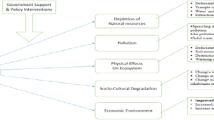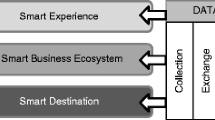Abstract
While tourism is often seen as a welcome source of economic development, conventional mass tourism is associated with numerous negative effects, such as the destruction of ecological systems and loss of cultural heritage. In response to these concerns, a term that has surfaced recently is, sustainable tourism. This article attempts to define sustainable tourism and asks the question of whether this new term is an acceptable criteria or is merely a marketing ploy to attract the morally conscious tourist.
Similar content being viewed by others
References
Abercrombie & Kent: 2005, Abercrombie & Kent Global Foundation, retrieved from the web-site of␣Abercrombie & Kent, http://www.akglobalfoundation.org
Banyan Tree: 2005, The Green Imperative, retrieved from the web-site of Banyan Tree Hotels & Resorts http://www.banyantree.com/greenimperative
Buckley R. (2003) Case Studies in Ecotourism. CABI Publishing, Oxon and Cambridge
Durbarry R. (2001). The Economic Contribution of Tourism in Mauritius. Annals of Tourism Research. 29(3):862–865
Fleckenstein M. P., Huebsch P. (1999). Ethics in Tourism – Reality or Hallucination. Journal of Business Ethics. 19(1):137–142
Honey M. (1999). Ecotourism and Sustainable Development: Who Owns Paradise? Island Press, Washington, DC
King B., Pizam A., Milman A. (1993) Social Impacts of Tourism, Host Perceptions. Annals of Tourism Research 20:650–655
Liu J. C., Sheldon P. J., Var T. (1987) Resident Perception of the Environmental Impacts of Tourism. Annals of Tourism Research 14:17–37
Liu Z. (2003). Sustainable Tourism development: A Critique. Journal of Sustainable Tourism 11(6):459–475
Mowforth M., Munt I. (2003) .Tourism and Sustainability. Development and New Tourism in the Third World. 2nd edition, Routledge, London and New York
Reid D. G. (2003) Tourism, Globalization and Development: Responsible Tourism Planning. Pluto Press, London
Stonich S., Sorenson J., Hundt A. (1995). Ethnicity, Class and Gender in Tourism Developments: The Case of the Bay Islands. Honduras, Journal of Sustainable Tourism 3(1):1–28
Sharpley R. (1999) Tourism, Tourists, and Society, 2nd Edition. Elm Publications, Huntingdon
Sharpley, R.: 2000, ‘In Defense of (mass) Tourism’, in Environmental Management and Pathways to Sustainable Tourism: Reflections on International Tourism (ed), pp. 269–284, (Business Education Publishers, Sunderland
Wearing S., Neil J. (2000) Ecotourism: Impacts, Potentials and Possibilities, 2nd Edition. Reed Publishing, Oxford
Wheeler M. (1995) Tourism Marketing Ethics: An Introduction. International Marketing Review 12(4):38–49
Williams, M.: 2002, ‘The Political Economy of Tourism Liberalization, Gender, and the GATS’, paper prepared for the International Gender and Trade Network (IGTN)
World Bank, 2003: Mauritius At a Glance, Retrieved from the web-site of the World Bank, http://www. worldbank.org/data/countrydata/countrydata.html
World Tourism Organization (WTO) (2001). World Tourism Vision 2020. World Tourist Organization, Madrid
World Tourism Organization (WTO): 2004a, Sustainable Tourism Development Conceptual Definition, retrieved from the Web-Site of the World Tourism Organization, http://www.world-tourism.org
World Tourism Organization (WTO): 2004b, Global Code of Ethics for Tourism (GCET), Retrieved from the Web-Site of the World Tourism Organization, http://www.world-tourism.org.
Author information
Authors and Affiliations
Corresponding author
Additional information
Paul Lansing is a professor of Business Administration at the University of Illinois at Urbana-Champaign. He received a J.D. Degree and a Graduate Degree in International Business.
Paul De Vries received an M.Sc BA, in Strategic Management from the Rotterdam School of Management, RSM Erasmus University.
Appendix
Appendix
World Tourism Organization (WTO) (2004) Sustainable tourism development requirements, retrieved from the web-site of the World Tourism Organization.
“Sustainable tourism should:
-
(1)
Make optimal use of environmental resources that constitute a key element in tourism development, maintaining essential ecological processes and helping to conserve natural heritage and biodiversity.
-
(2)
Respect the socio-cultural authenticity of host communities, conserve their built and living cultural heritage and traditional values, and contribute to inter-cultural understanding and tolerance.
-
(3)
Ensure viable, long-term economic operations, providing socio-economic benefits to all stakeholders that are fairly distributed, including stable employment and income-earning opportunities and social services to host communities, and contributing to poverty alleviation. (WTO, 2004a, b)”
Rights and permissions
About this article
Cite this article
Lansing, P., Vries, P.D. Sustainable Tourism: Ethical Alternative or Marketing Ploy?. J Bus Ethics 72, 77–85 (2007). https://doi.org/10.1007/s10551-006-9157-7
Received:
Accepted:
Published:
Issue Date:
DOI: https://doi.org/10.1007/s10551-006-9157-7




